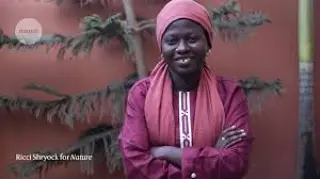The baggage of colonialism has sadly led to a gross mistrust of her dealings, the price of which is reflected in the perception of education among the rural population as having ulterior motives and agenda. More specifically, scientific literacy in Africa has fared rather poorly.
Statistics have it that only 1.7 of 10 college students are enrolled in a STEM-related field, hence, burdened by this plight and inspired by the Black Panther movie which amazingly portrayed how local language, culture, and ancestral knowledge can be integrated with science, Molecular and Cellular Biologist and entrepreneur Khady Sall upon dusting her Ph.D. from Oregon State University in 2017, knowing a career in academia wouldn’t provide the much-needed satisfaction, decided to come back home to Senegal to found her non-profit, Science Education Exchange for Sustainable Development (SeeSD).
Khady Sall is Founder, Executive Director, SeeSD whose vision is to foster Science, Technology, Engineering, Art, and Mathematics (STEAM) education, encouraging critical thinking, and scientific literacy from K-12 and beyond in Senegal.
SeeSD, which aims to inspire new generations in Senegal to pursue STEAM education provides a hands-on approach to scientific education that engages students of all ages, as well as creates a platform for educators to share their knowledge.
Through hands-on activities, and events where STEAM professionals, educators, and inventors from across Senegal link local schools and universities through mentorship, creating open STEAM educational resources that are adapted to local challenges, and translated into a local language, higher education and entrepreneurship is powered.
She believes in order to record progress in Senegal, local language and culture must be brought into the mix:
“You can get there by being authentic and you can do that by teaching science in the local language, such as Wolof, a language of Senegal, Gambia and Mauritania.”
She also founded an innovation lab named Ubbil.
Although Sall disclosed the journey has been fraught with challenges, saying it is not easy, she isn’t backing down, looking back she says:
“I chose the struggle. I was pushing myself and pushing my SeeSD colleagues, too. We were young, we lacked experience, we made mistakes, but we learnt by doing. I’ve grown so much since I came back. You have to negotiate the lack of funding, human resources and training. We started something out of nothing.”
“We clearly need to expand science, technology, engineering and mathematics education. The ramifications of the COVID-19 pandemic are showing us the dangers of not guiding students towards jobs in biotechnology and artificial intelligence that will define the future. If we are not part of the global economy, leveraging knowledge to create technologies, then we are doomed.”
“Gender bias is an issue for women everywhere, and here I also encounter bias against young people. I try to overcome these biases by speaking through my work. It’s not my personality to promote myself on social media as an influencer or at international conferences.
“The hardest part about being a female entrepreneur is that you will definitely need to work twice as hard as a man to succeed. People will tend to underestimate you. But at some point, you should be unapologetic about your leadership. Just get the work done. Show your organizational skills.” She says of her journey.



